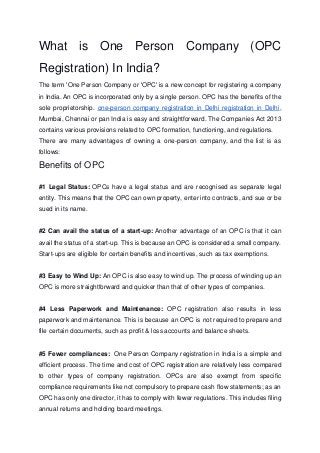
What is One Person Company (OPC Registration) In India?
- 1. What is One Person Company (OPC Registration) In India? The term 'One Person Company or 'OPC' is a new concept for registering a company in India. An OPC is incorporated only by a single person. OPC has the benefits of the sole proprietorship. one-person company registration in Delhi registration in Delhi, Mumbai, Chennai or pan India is easy and straightforward. The Companies Act 2013 contains various provisions related to OPC formation, functioning, and regulations. There are many advantages of owning a one-person company, and the list is as follows: Benefits of OPC #1 Legal Status: OPCs have a legal status and are recognised as separate legal entity. This means that the OPC can own property, enter into contracts, and sue or be sued in its name. #2 Can avail the status of a start-up: Another advantage of an OPC is that it can avail the status of a start-up. This is because an OPC is considered a small company. Start-ups are eligible for certain benefits and incentives, such as tax exemptions. #3 Easy to Wind Up: An OPC is also easy to wind up. The process of winding up an OPC is more straightforward and quicker than that of other types of companies. #4 Less Paperwork and Maintenance: OPC registration also results in less paperwork and maintenance. This is because an OPC is not required to prepare and file certain documents, such as profit & loss accounts and balance sheets. #5 Fewer compliances: One Person Company registration in India is a simple and efficient process. The time and cost of OPC registration are relatively less compared to other types of company registration. OPCs are also exempt from specific compliance requirements like not compulsory to prepare cash flow statements; as an OPC has only one director, it has to comply with fewer regulations. This includes filing annual returns and holding board meetings.
- 2. #6 Easy incorporation: The incorporation of an OPC is relatively easy, this type of company incorporation requires only one shareholder and one director. The main requirement is to have a minimum authorised capital of Rs.1 lakh. The OPC registration process can be completed online on the MCA portal. #7 Perpetual succession: An OPC has perpetual succession, meaning it continues to exist even if the owner dies or leaves the country. The ownership and management of the OPC are not affected by the death or departure of the shareholder or director. The nominee whose name has been mentioned in the Memorandum of Association will become the member of the company in the event of death of the existing member. OPC registration in India is a relatively new concept, and there are many advantages to owning an OPC. These advantages include a legal status, the ability to avail the status of a start-up, ease of incorporation, and perpetual succession. If you are considering of starting a company alone, then OPC may be the right choice.
